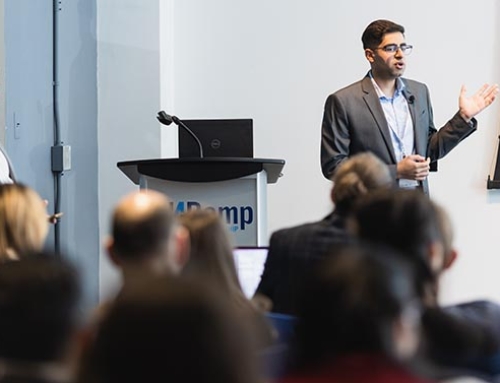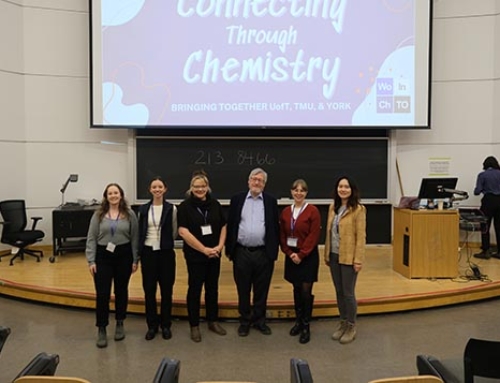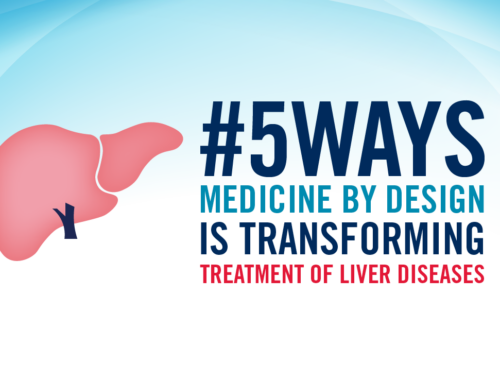
Michelle Forsyth, an associate professor at OCAD University, has created an original screen print for the Medicine by Design Global Speaker Series that interprets Toronto’s strengths in regenerative medicine through the lens of art. (Credit: Harbinger Communications)
For Michelle Forsyth, creating art for the Medicine by Design Global Speaker Series was no ordinary commission.
Forsyth, an associate professor at OCAD University in Toronto, is an award-winning artist who has exhibited and taught in Canada and internationally. She also has early-onset Parkinson’s disease, a progressive neurological condition that researchers think could some day be treated with regenerative medicine therapies.
“With the production of this piece, I was interested in exploring the relationship between cell division and the printmaking process because a print, by its very nature, is one of many reproductions or copies,” Forsyth said.
“I found it an unique challenge to make a series of prints that were reflective of cellular form while still keeping the imagery abstract enough to be able to have artistic licence to make an interesting image.”
Medicine by Design will present the first of Forsyth’s limited-edition screen prints to Alfonso Martinez-Arias, a professor in the Department of Genetics at the University of Cambridge, on Oct. 19. Martinez-Arias’s talk exploring the development of mammalian embryos through an engineering lens kicks off the 2017–2018 edition of the Medicine by Design Global Speaker Series, which brings established and emerging international leaders in regenerative medicine to Toronto to engage with the Medicine by Design community.
That community includes more than 100 researchers and more than 300 trainees at the University of Toronto and its affiliated hospitals who are working at the convergence of disciplines — from engineering and mathematics to life sciences and medicine — to accelerate transformative discoveries in regenerative medicine.
Forsyth’s recent work reflects aspects of her domestic space, with hand-produced copies of items in her home forming the nexus of her art. She uses a variety of techniques to make them, including weaving, printmaking, sculpture and painting, and photographs the copies in stacks or piles with hand-painted backdrops. Forsyth alters the final photographic works in Photoshop or by hand until they appear to defy strict categorization.
To create the prints for Medicine by Design, Forsyth first made a series of paintings of patterns on paper using a circle template. She chose the circle for its cell-like shape and the way it lends itself to pattern generation. She then crumpled each piece of paper in a similar way to reference metaphorically different ideas coming together into a seamless whole.
The individual parts are united within the space of her composition, which incorporates a view of the Toronto skyline from the University of Toronto’s Donnelly Centre for Cellular & Biomolecular Research, where several Medicine by Design-funded investigators have their labs. Forsyth placed the CN Tower over one of the crumpled forms to mimic the look of a pipette. She made the finished screen print at Open Studio, a co-operative print studio in Toronto, with Harbinger Communications coordinating the design and framing of the finished piece.
Forsyth recently underwent deep brain stimulation at Toronto Western Hospital, and is writing a memoir and producing a series of drawings about the experience.
Commissioning the limited-edition print offered an opportunity to view regenerative medicine from a different perspective and strengthen engagement between Medicine by Design and the broader community, said Medicine by Design Executive Director Michael Sefton.
“A number of things drew us to Michelle’s work: her innovative use of diverse materials, her exploration of patterns and textures, and her personal experience,” Sefton said. “She has done a remarkable job of representing Toronto’s strengths in regenerative medicine, and we are proud that her work will hang on the walls of some of the most accomplished global researchers in the field.”
Medicine by Design offers its Global Speaker Series in partnership with the Ontario Institute for Regenerative Medicine. They are co-hosting the Oct. 19 event with the Institute of Biomaterials & Biomedical Engineering’s Distinguished Seminar Series.





